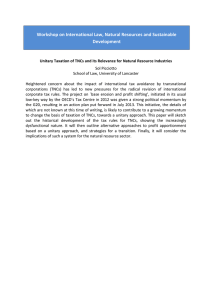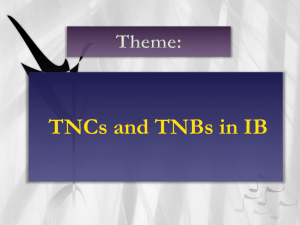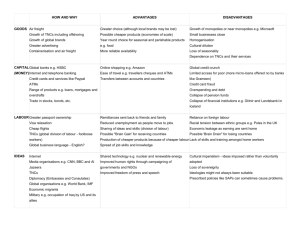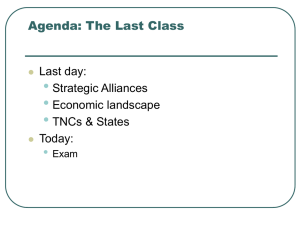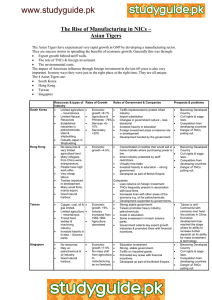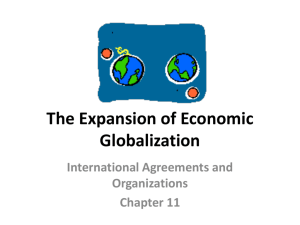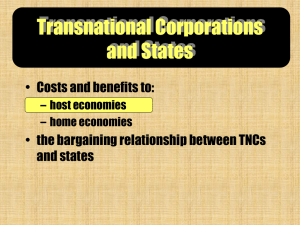Human Rights Council
advertisement
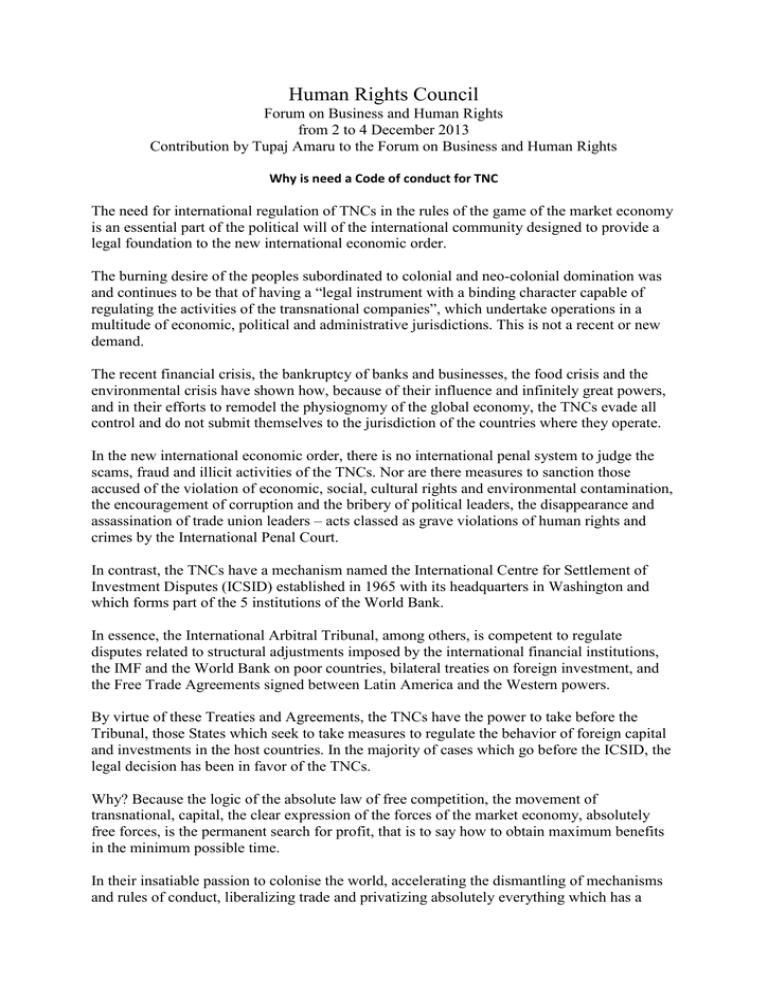
Human Rights Council Forum on Business and Human Rights from 2 to 4 December 2013 Contribution by Tupaj Amaru to the Forum on Business and Human Rights Why is need a Code of conduct for TNC The need for international regulation of TNCs in the rules of the game of the market economy is an essential part of the political will of the international community designed to provide a legal foundation to the new international economic order. The burning desire of the peoples subordinated to colonial and neo-colonial domination was and continues to be that of having a “legal instrument with a binding character capable of regulating the activities of the transnational companies”, which undertake operations in a multitude of economic, political and administrative jurisdictions. This is not a recent or new demand. The recent financial crisis, the bankruptcy of banks and businesses, the food crisis and the environmental crisis have shown how, because of their influence and infinitely great powers, and in their efforts to remodel the physiognomy of the global economy, the TNCs evade all control and do not submit themselves to the jurisdiction of the countries where they operate. In the new international economic order, there is no international penal system to judge the scams, fraud and illicit activities of the TNCs. Nor are there measures to sanction those accused of the violation of economic, social, cultural rights and environmental contamination, the encouragement of corruption and the bribery of political leaders, the disappearance and assassination of trade union leaders – acts classed as grave violations of human rights and crimes by the International Penal Court. In contrast, the TNCs have a mechanism named the International Centre for Settlement of Investment Disputes (ICSID) established in 1965 with its headquarters in Washington and which forms part of the 5 institutions of the World Bank. In essence, the International Arbitral Tribunal, among others, is competent to regulate disputes related to structural adjustments imposed by the international financial institutions, the IMF and the World Bank on poor countries, bilateral treaties on foreign investment, and the Free Trade Agreements signed between Latin America and the Western powers. By virtue of these Treaties and Agreements, the TNCs have the power to take before the Tribunal, those States which seek to take measures to regulate the behavior of foreign capital and investments in the host countries. In the majority of cases which go before the ICSID, the legal decision has been in favor of the TNCs. Why? Because the logic of the absolute law of free competition, the movement of transnational, capital, the clear expression of the forces of the market economy, absolutely free forces, is the permanent search for profit, that is to say how to obtain maximum benefits in the minimum possible time. In their insatiable passion to colonise the world, accelerating the dismantling of mechanisms and rules of conduct, liberalizing trade and privatizing absolutely everything which has a mercantile and monetary value, the TNCs behave like cold entities without morals or ethics, nor do they submit themselves to the national jurisdiction, laws and rules of the countries where they operate. In our days, no economic, financial, social or cultural problem, regardless of its dimension or importance, escapes the voracity of the TNCs, true octopuses which take over the production and distribution of goods and services, capital accumulation, the transfer and closure of businesses, massive redundancies, speculation in the stock exchange, provoking economic, financial and environmental crisis with grave consequences for peace and collective security. Because of such a vast and complex universe, and their supranational powers, solidly embedded in the fundamental aspects of economies from North to the South, and even in the United Nations, the TNCs behave in an irrational and anarchic manner, More and more, they are omnipresent in the lands and territories of indigenous peoples and with total impunity, they covet their natural resources, considered strategic for the development of the Western world. In their zeal to achieve maximum benefits and the accumulation of profit, the decision centre of a conglomerate of consortia and monopolies uses a series of mechanisms, from financial institutions like the World Bank, the IMF, the WTO etc., to illicit means, such as bribes to senior State officials, parliamentarians, and the military, the corruption of business men, including political pressure and economic blackmail against sovereign states that do not submit to their orders. In Bolivia, the TNC, Gulf Oil Company orchestrated and financed the military coup against the oppressive government of J.J. Torres in 1971. In Guatemala, the American TNC, United Fruit Company was involved in the overthrow of the government of Jacob Arbenz in 1954 because he had decreed an Agrarian Reform law. Taking into account the above, the UN Forum on Business and Human Rights, in its efforts to relegate the non-binding guidelines and simple voluntary recommendations, which have already failed in the past, is seeking to deliver the survival of humanity exclusively to the invisible hand of transnational capital and the blind laws of the market, which behave like the law of universal gravity. The developing countries and indigenous peoples are opposed to this show of the Forum on Business and Human Rights, which pretends to reconcile human rights with the ferocious appetites of big capital. We are conscious of the urgent necessity to establish an international instrument with a binding legal nature capable of regulating the activities of the TNCs. Since the beginning of the negotiations “in 1974 in the framework of the United Nations, the developing countries and indigenous peoples, who have been under colonial domination, always have advocated the need to promote legal norms or an instrument with a binding character. The Group of 77, which was the main driving force behind the binding legal framework, advocated that the scope of the Code should be exclusively in relation to the TNCs and the banking conglomerates which evade all control. In 1992, the States, under political pressure from Washington, decided to abandon the discussion about one of the most relevant problems of “industrial civilization”. The failure of the negotiations on the Code, without doubt, is the result of the pressure exercised by powerful economic circles and financial conglomerates of the Western powers, in particular the impact of the guidelines provided by the World Bank and the IMF concerning the treatment of foreign direct investment (FDI). Conclusion In the moment when humanity sinks slowly into chaos and violence, the aggressive wars for the control of natural resources and in a world without laws or morality, the absence of an international legal framework capable of regulating activities of powerful TNCs and banks is felt most acutely. The need for a Code of Conduct with a binding character is needed for various reasons: 1) In the new international economic order, a definition or international penal jurisdiction does not exist, whereby those responsible in the TNCs and banks accused of fraud and illicit activities, interference in political life, corruption, and bribery of political leaders and the assassination of trade unionists, all of which are acts which amount to grave crimes, can be judged. 2) The true owners of this earth who subordinate us are the 100 giant and powerful TNCs, 50 infinitely powerful financial corporations and 10 powerful pharmaceutical and agro-industrial corporations, which constitute a true web, which entangles production and consumption, trade in goods and services and capital investment throughout the world. 3) The invisible hand of powerful monopolies and holdings, in permanent search for profit and greater accumulation of capital, because of their very essence and their nature, behave in an irrational and instinctive manner, and do not submit to the jurisdiction of the host country. Social problems and human rights do not interest them. 4) States from North to South have lost the capacity to adopt rules of conduct and legally cannot demand jurisdiction over the TNCs and financial holdings established in their territories, because often there does not exist a reference for the term transnational property, nor definition of the concept of corporate nationality nor a legal statute. 5) The supranational economic and financial entities are neither national nor stateless, but function and submit to the headquarters company in a vertical manner that is to say to the jurisdiction of the centres of decision installed in the Western powers. 6) Given their natural instinct to grow, these great financial monsters of our planet, the magnates and speculators, using derivatives and speculative funds created by financial engineering, including profit manipulations, are free to carry out fraud and deceit, in complete impunity. They use many invisible tricks to enrich themselves and are always in permanent search of high profits on the Wall Street stock exchange, and enjoy extraterritoriality in order to avoid being taxed. The TNCs and financial empires which form the global oligarchy, represented and defended by the Western powers, subjugate the peoples of the world as if never before in the history of humanity, they had possessed an empire. Tupaj Amaru

